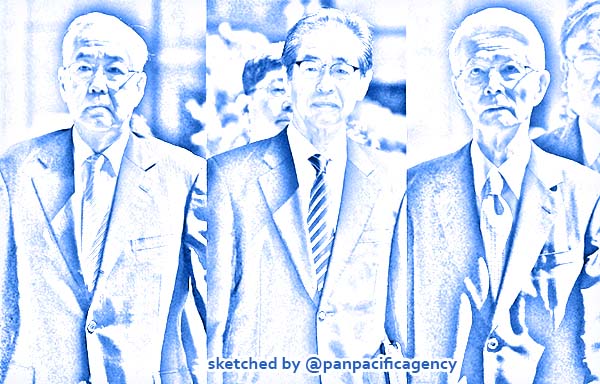Ex-Tokyo Electric Power Co execs acquitted over Fukushima nuclear crisis

In this combined photo, from right, former TEPCO Chairman Tsunehisa Katsumata, and former TEPCO vice presidents Ichiro Takekuro and Sakae Muto enter into the Tokyo District Court before a verdict in Tokyo's Chiyoda Ward, on Sept. 19, 2019. (Mainichi/Toshiki Miyama). Sketched by the Pan Pacific Agency.
TOKYO, Sep 19, 2019, Kyodo. Three former executives of Tokyo Electric Power Company Holdings Inc. were acquitted Thursday on charges of failing to prevent the Fukushima nuclear disaster, triggered by the 2011 earthquake and tsunami in northeastern Japan, reported The Mainichi.
At the Tokyo District Court, former TEPCO Chairman Tsunehisa Katsumata, 79, along with Ichiro Takekuro, 73, and Sakae Muto, 69, both former vice presidents, had argued they could not have foreseen the massive tsunami that crippled the Fukushima Daiichi power plant and caused core meltdowns.
The three were indicted for failing to implement tsunami countermeasures leading to the deaths of 44 people — including patients forced to evacuate from a hospital — as well as for injuries sustained by 13 people in hydrogen explosions at the plant.
Court-appointed lawyers acting as prosecutors had called for five-year prison terms for the trio, claiming they would have prevented the nuclear disaster if they had fulfilled their responsibility to collect information and implement safety measures.
“It would be impossible to operate a nuclear plant if operators are obliged to predict every possibility about a tsunami and take necessary measures,” Presiding Judge Kenichi Nagafuchi said in handing down the ruling.
The three were charged in 2016 with professional negligence resulting in death and injury by the court-appointed lawyers after an independent panel of citizens mandated indictment.
The panel’s decision came after Tokyo prosecutors twice decided not to charge the men over the world’s worst nuclear crisis since the 1986 Chernobyl disaster.
The trial focused on whether the former executives should have foreseen the massive tsunami and prevented the accident, given that it was calculated tsunami waves of up to 15.7 meters could strike the Fukushima plant based on the government’s long-term evaluation of quake risks in 2002. The estimate was reported to TEPCO in 2008.
The defense team argued the three could not have envisaged tsunami waves on the scale of those that hit the plant based on the government evaluation — which the former executives considered unreliable — and said installing coastal levees would not have prevented the disaster.
“We once again offer our sincerest apologies for causing great trouble and worries to many people, including people in Fukushima Prefecture,” TEPCO said in a statement after the ruling.
“Starting with Fukushima’s reconstruction, we are putting all efforts” on providing compensation for damages related to the disaster, decommissioning work and decontamination, the utility said, adding it is determined to reinforce security measures at nuclear power plants.
On March 11, 2011, the six-reactor plant on the Pacific coast was flooded by tsunami waves exceeding 10 meters triggered by the magnitude 9.0 quake, causing the reactor cooling systems to lose their power supply.
Nos. 1 to 3 reactors subsequently suffered core meltdowns, while hydrogen explosions damaged the building housing the Nos. 1, 3 and 4 units. Around 160,000 people were evacuated at one point.